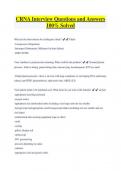CRNA Interview Questions and Answers 100% Solved What are the interventions for cardiogenic shock? ✔️✔️-Fluids -Vasopressors (Dopamine) -Inotropes (Dobutamine, Milrinone for heart failure) -IABP, ECMO Your ventilator is peak pressure alarming. What could be the problem? ✔️✔️-Normal plateau pressure - Kink in tubing, patient biting tube, mucous plug, bronchospasm, ETT too small -If high plateau pressure - there is an issue with lung compliance ie: developing PNA, pulmonary edema, auto PEEP, pneumothorax, right main stem, ARDS, ILD Your patient needs to be intubated soon. What items do you want at the bedside? ✔️✔️-suction -appropriate -sized bag and mask -oxygen source -appropriate size endotracheal tubes including a size larger and one size smaller -laryngoscope and appropriate -sized laryngoscope blades (including one size smaller and one size larger) -endotracheal tube -securing equipment (tape or other) -stylet -syringe -pillow, blanket roll -stethoscope -IVF, pressure bag -pressors depending on status -sedation -appropriate sized nasogastric tubes -x-ray on standby What are some reasons for post operative tachycardia? ✔️✔️Postoperative sinus tachycardia is often attributed to catecholamine release in response to surgical stress or anemia. -Pain -Hypovolemia -Anemia -Drug induced -Cardiac problem (MI, tamponade) -Pulmonary problem (Pneumothorax, PE) What is the difference between CRNA and MDA? ✔️✔️-Schooling: MDA is a licensed medical doctor with 12 years of schooling, CRNA requires 6 -7 years of schooling -In most states, nurse anesthetists cannot administer anesthesia without the supervision of a board certified doctor (19 states removed - Texas still requires) -Similar job roles & responsibilities -Rural areas more commonly have CRNAs, hospitals have both Do you understand "opt out"? ✔️✔️-The federal requirement has been that CRNAs must be supervised by a physician. The November 13, 2001 rule allows states to "opt -out" or be "exempted" from the federal supervision requirement. -For a state to "opt -out" of the federal supervision requirement, the state's governor must send a letter of attestation to CMS. The letter must attest that: 1. The state's governor has consulted with the state's boards of medicine and nursing about issues related to access to and the quality of anesthesia services in the state; and 2. That it is in the best interests of the state's citizens to opt -out of the current federal physician supervision requirement; and 3. That the opt -out is consistent with state law. Discuss the role of the sympathetic nervous system. ✔️✔️-Subdivision of the autonomic nervous system - "fight or flight" -Involved in preparing the body for stress -related activities, slows bodily processes that are less important in emergencies such as digestion -Patho: The amygdala will send a distress signal to the hypothalamus. Impulses are then transmitted through the SNS to the adrenal glands, which then pumps adrenaline into the blood stream. -Increase heart rate, Dilation of the pupil, Secretion of sweat glands, Increased alertness, Slowing down or stopping digestion, Relaxation of the bladder -There are two types of neurons within the sympathetic nervous system: the preganglionic neurons (originate in brain and spinal cord) and the postganglionic neurons (outside spinal cords), or ganglion cells. -Neurotransmitters involved: Acetylcholine, Epi, Norepi Discuss the role of the parasympathetic nervous system. ✔️✔️-Subdivision of the autonomic nervous system - "rest and digest" - keeps the basic functions of your body working as they should. -PSNS starts in your brain and extends out via long fibers that connect with special neurons near the organ they intend to act on -Constricts pupils, causes salivation, slows down the heart rate, tightens the bronchi in the lungs, enacts digestion, releases bile, makes the bladder contract Tell us about a critical patient you had and the pathophysiology behind their disease. ✔️✔️Urosepsis -> Septic Shock -> ARDS -> HFOV How does IABP work? ✔️✔️-The IABP consists of a thin, flexible tube called a catheter. Attached to the tip of the catheter is a long balloon. The other end of the catheter attaches to a computer console which has a mechanism for inflating and deflating the balloon at the proper time when your heart beats. -An IABP allows blood to flow more easily into your coronary arteries. It also helps your heart pump more blood with each contraction. -How it works: 1. Deflated in systole (heart contracts) so blood can be ejected with less resistance & also has a vacuum effect pulling blood forward 2. In diastole, balloon inflates & pushes blood back towards coronary arteries, improving perfusion -Indications: MI, CHF, defects, arrhythmia, myocarditis What coronary is affected in an anterior lateral MI? ✔️✔️**Left anterior descending coronary artery (LAD)** -Also known as anterior wall MI, or AWMI, or anterior ST segment elevation MI, or anterior STEMI -Occurs when anterior myocardial tissue usually supplied by the left anterior descending coronary artery suffers injury due to lack of blood supply. -Poorest prognosis How can you lower ICP? ✔️✔️-Elevate HOB -Hyperventilate - to cause vasoconstriction -Mannitol 0.25 -1g/kg (elevates blood plasma osmolality, resulting in enhanced flow of water from tissues into interstitial fluid and plasma)




